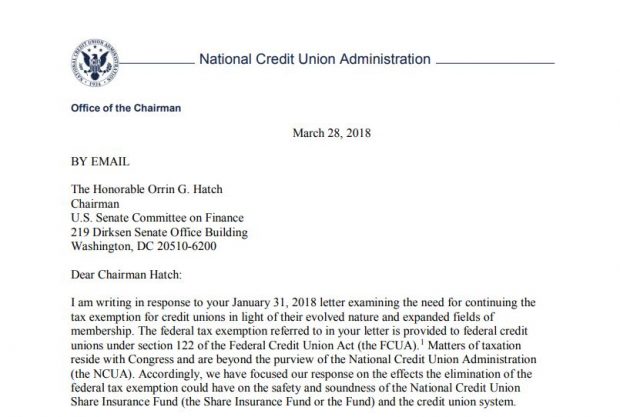
Removing the federal tax exemption for credit unions would devastate credit unions and could lead to a taxpayer bailout of the share insurance fund, NCUA Board Chairman J. Mark McWatters told Senate Finance Chairman Orrin Hatch (R-Utah), according to a document obtained by CU Times.
If Congress removes the exemption, it also would have to remove the field of membership and other restrictions on credit unions to keep the system safe and sound, McWatters wrote Hatch.
McWatters's comments came in a response to a letter Hatch sent to him in February questioning whether the credit union tax exemption is outdated.
CU Times obtained a copy of that document on Monday.
“We believe that eliminating the credit union tax exemption, without also eliminating the statutory restrictions on credit unions, would almost certainly have a detrimental effect on the credit union system and increase losses to the Share Insurance Fund, which could ultimately fall to U.S. taxpayers,” McWatters said.
Hatch had said the NCUA has relaxed field-of-membership constraints, opened the door to the use of alternative capital and lifted limits on business lending.
Hatch also said that the federal credit union common bond requirements have been watered down through “regulatory interpretations and a dearth of enforcement in recent decades.”
Hatch's questions come as the credit union industry was breathing a sigh of relief since Congress enacted a tax overhaul bill last year without touching the credit union tax exemption.
Hatch is not subject to the usual political pressure that comes from raising such a divisive issue, since he is retiring at the end of the year.
In the letter, McWatters said that the regulatory changes adopted by the NCUA are consistent with federal law and the spirit of President Trump's Executive Order on regulatory relief.
McWatters said the NCUA conducted an analysis of the impact of eliminating the tax exemption would have on credit unions.
That analysis found that for the share insurance fund to remain sound, Congress also would need to eliminate the field of membership restrictions, member business loan limits, investment capital restrictions, investment authority restrictions and other restrictions imposed by federal law.
“In other words, a safety and soundness issue would most likely arise if credit unions are not offered a level playing field with other taxed depository institutions, including an option to make something akin to an S corporation election for purposes of taxation,” McWatters said.
He added that the strict structural limits that Congress placed on credit unions distinguish them from other financial institutions, and, in the eyes of Congress, that justified the tax exemption.
He said the agency has endeavored to consistently construe the authority of federal credit unions to allow them to serve the needs of their members, while, also remaining true to federal law.
Hatch had asked whether the agency maintained records on associational charters that were rejected because they did not meet NCUA common bond requirements.
McWatters said the agency has processed 1,890 requests to serve associational groups since its rules were updated in 2015.
Of those, 79.58% of the applications were approved and 0.16% were rejected.
McWatters said that the low denial rate was the result of the agency working with credit unions to find solutions for a possible denial.
McWatters also distinguished the differences between state-chartered credit unions and CUSOs.
“Please note that some services and activities typically attributed to credit unions are actually provided by state-chartered entities called credit union service organizations,” he wrote.
The federal credit union act allows federal credit unions to organize, invest in and lend to those service organizations. However, the CUSOs are not subject to NCUA examination and are not tax exempt.
McWatters also addressed the thorny issue of executive compensation—another issue raised by Hatch.
The agency does not require credit unions to break out individual executives' compensation.
He added, however, that NCUA examiners are required to assess executive compensation to ensure that the levels are reasonable.
“Taken together, the NCUA's regulations and exam policies help ensure that any compensation practices that could pose a threat to a credit union's safety and soundness are identified and addressed quickly,” McWatters said.
© 2025 ALM Global, LLC, All Rights Reserved. Request academic re-use from www.copyright.com. All other uses, submit a request to [email protected]. For more information visit Asset & Logo Licensing.







